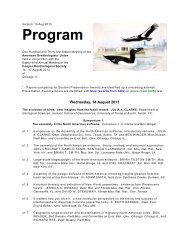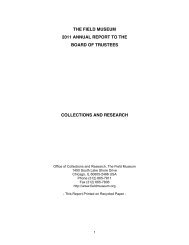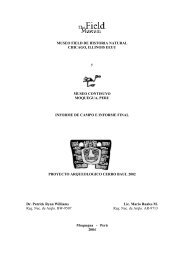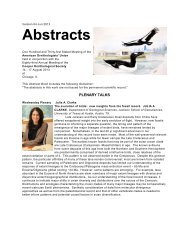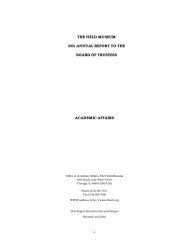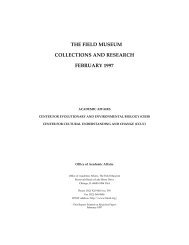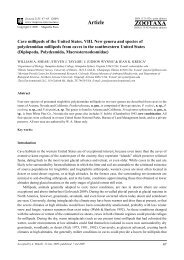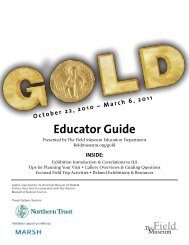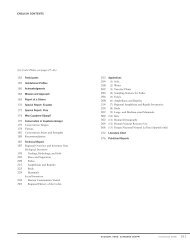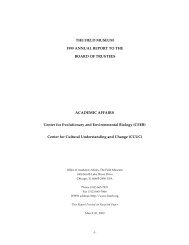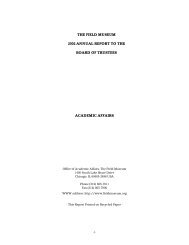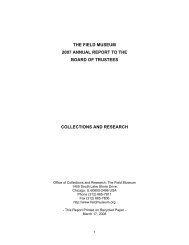2006-2007 - The Field Museum
2006-2007 - The Field Museum
2006-2007 - The Field Museum
You also want an ePaper? Increase the reach of your titles
YUMPU automatically turns print PDFs into web optimized ePapers that Google loves.
TRAINING PROGRAMS, <strong>2006</strong><br />
Members of <strong>The</strong> <strong>Field</strong> <strong>Museum</strong>’s scientific staff contribute to a wide spectrum of formal and hands-on<br />
training in collections-based research for high school, undergraduate and graduate students, and young<br />
professionals. Building on the <strong>Museum</strong>’s core subject matter in evolutionary and environmental biology<br />
and anthropology/archaeology, these programs meet a variety of needs—from encouraging young<br />
students to consider careers in the sciences, to training young scientists from other countries in research<br />
techniques that enable them tackle environmental conservation issues at home. From suburban high<br />
school interns to NGO scientists, from Chicago neighborhoods to the tropics, <strong>Field</strong> <strong>Museum</strong> scientists<br />
lend their expertise to train future generations of biologists and anthropologists. <strong>The</strong> following is an<br />
overview of the diverse array of training programs to which <strong>Field</strong> <strong>Museum</strong> scientists contribute.<br />
UNDERGRADUATE INTERNSHIPS<br />
<strong>Field</strong> <strong>Museum</strong> Scholarship Committee Internships. Each year <strong>The</strong> <strong>Field</strong> <strong>Museum</strong> supports threemonth<br />
internships for undergraduate students and recent graduates to work directly with scientists at the<br />
<strong>Museum</strong> on collections-based research projects. For summer <strong>2006</strong>, six students worked on projects in<br />
Anthropology (studying the impact of Christianity on the peoples of Western Kenya), Botany (working on<br />
a revision of the Usnea strigosa group based on molecular and morphological data; gaining experience in<br />
the taxonomy and systematics of Hymenomycetes, and learning the management of a fungi herbarium),<br />
and Zoology (learning to systematically organize and label a collection [carabid beetles], and improving<br />
identification skills; video recording feeding events of a coral reef fish species to analyze skull function<br />
and compare skull anatomies; investigating the systematics of the yellow-faced horseshoe bats species<br />
complex). <strong>The</strong> students hailed from the University of Illinois at Chicago, College of the Atlantic (Bar<br />
Harbor, ME), University of Wisconsin at Madison, University of Toronto, University of Pennsylvania<br />
(Philadelphia, PA), and the Universidad de San Carlos de Guatemala.<br />
Prince Internship. This program, funded by the Prince Charitable Trust, provides support for visiting<br />
scientists as well as women and minority interns at the secondary and college levels. <strong>The</strong>re were three<br />
Prince interns in <strong>2006</strong>: Celine Vaaler (Lawrence University) in CCUC created a comprehensive database<br />
of resources related to the Lake Park Crescent project, compiling information through fieldwork in the<br />
North Kenwood-Oakland neighborhood, interviews with relevant experts, and research on government<br />
documents. Katherine Lauer (University of Chicago) worked in the Botany Department, assisting with<br />
mycology research through field work, specimen processing, database entry, and other herbarium<br />
assistance. Shannon Loomis (Northwestern University) gathered and analyzed images of fossil leaf<br />
cuticles to measure “stomatal index,” a tool used to estimate CO2 levels in the fossil record.<br />
Boone Scholars Internships for East Asian Studies. Supported by a bequest from the late<br />
Commander Gilbert E. Boone and his wife Katharine Phelps Boone, the Boone Scholars Internships for<br />
East Asian Studies allow highly qualified undergraduates the opportunity to study at <strong>The</strong> <strong>Field</strong> <strong>Museum</strong><br />
and research Anthropology collections from Japan, Korea, China, and elsewhere in the eastern part of<br />
Asia. Boone Scholars engage in a wide variety of tasks, ranging from individual research to assisting<br />
collections management teams in maintaining the collection. <strong>The</strong>re were two Boone interns for <strong>2006</strong><br />
under the supervision of Anne Underhill and Ben Bronson. Pendry Haines (University of Chicago)<br />
conducted research on prints and stencils from historic Japan, and Craig Hadley (Beloit College) assisted<br />
in preparations for the re-publication of a <strong>Field</strong>iana issue from 1923 (Vol. 16) about the Japanese tsuba<br />
(sword hand guards) in the Frank W. Gunsaulus collection of sword decoration.<br />
Anthropology Alliance Interns. This six-year old program, initiated by the “Anthropology Alliance,” the<br />
Anthropology Department’s auxiliary “friends” group, supports undergraduate involvement in anthropology<br />
research, including direct salary for <strong>Museum</strong>-based undergraduate collection management interns, and<br />
travel expenses for interns assisting in archaeological or ethnographic field work. In <strong>2006</strong> three<br />
Anthropology Alliance interns worked on the Department’s vast collections, and two assisted with<br />
fieldwork. Lisa Nosek of the University of Illinois at Chicago worked on the Captain Fuller Sonaband<br />
94



